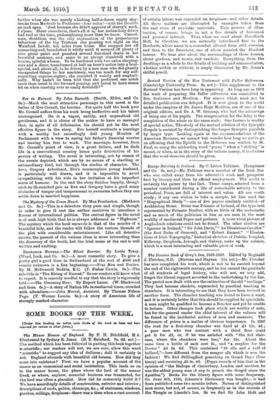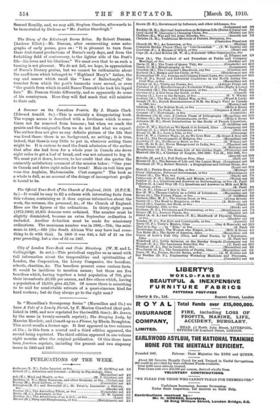The Pension Book of Gray's Inn, 1669 - 1800. Edited by Reginald
J. Fletcher, B.D. (Stevens and Haynes. 21s. net.)—Mr. Fletcher has now completed his work, which is not to be carried beyoed the end of the eighteenth century, and he has earned the gratitude of all students of legal history, who will not, we may add, forget the liberal support accorded to the undertaking by the Inn. The period now dealt with saw the extinction of the old "readings." They had become obsolete, superseded by practical teaching in clambers. It is interesting to see that they have been revived in another form. The chamber teaching was found to leave a want, and it is certainly better that this should be supplied by specialists. A man might be qualified to become a Bencher and yet be unable to lecture. Other changes took place which are worthy of note, but for the general reader the chief interest of the volume will be found in the incidental notices of men and manners. The difference of prices is a matter of obvious importance. In 1687 the rent for a first-story chamber was fixed at ..fll 13s. 4d.; a poor man who was content with a third floor could get it for .t1, or, if he was satisfied with "the 3rd stair- case, where the chambers were less," for 15s. About the same time a bottle of sack cost 2s., and "a surplice for the
Doctor" 5a. 6d. This contained "10 ells and a half of holland,"—how different from the meagre alb which is now the fashion ! We find Stillinglieet preaching on Grand Days (four times) and receiving .£5 88. 4d. (Pepys records of him that in the opinion of "the Bishops of Canterbury, London and another, he was the ablest young man of any to preach the Gospel since the Apostles.") Books for the library figure with some frequency. On June 6th, 1755, Johnson's Dictionary was bought,—it had been published some two months before. Names of distinguished men occur, but not, of course, so frequently as in the records of the Temple or Lincoln's Inn. So we find Sir John Holt and Samuel Komilly, and, we may add, Stephen Owelee, afterwards to be immortalisd by Dickens as "Mr. Justice Stareleigh."







































 Previous page
Previous page